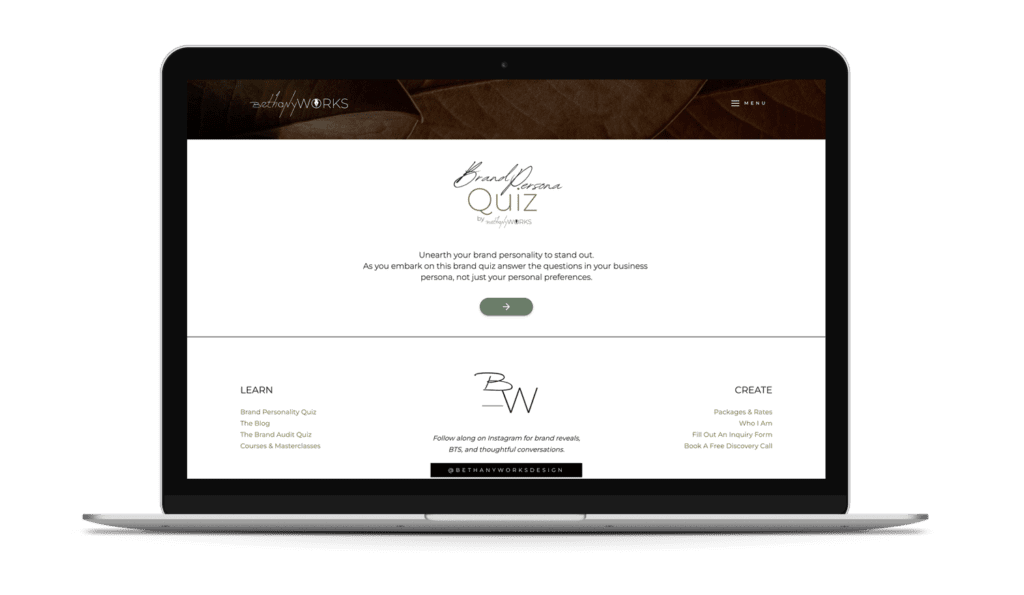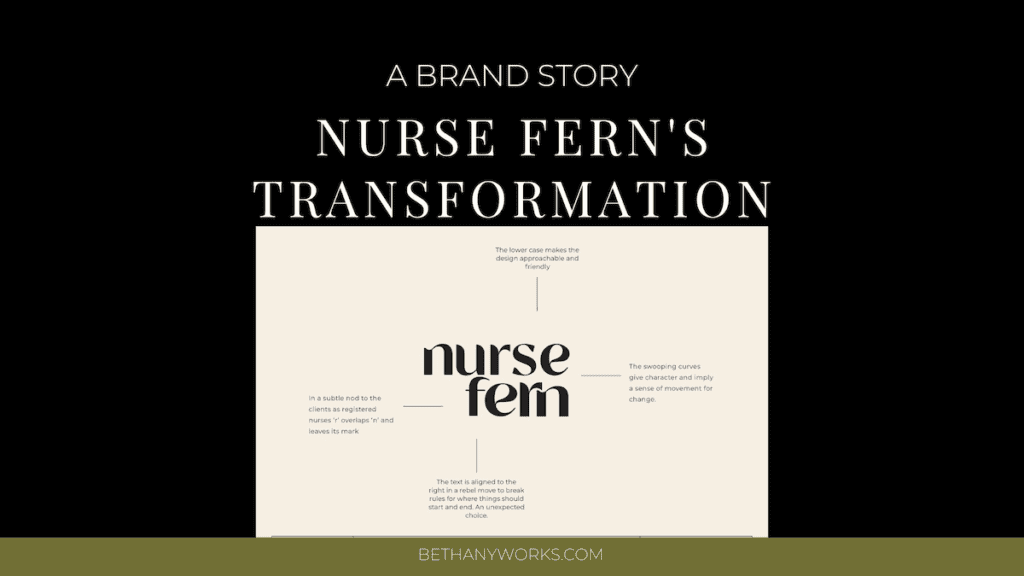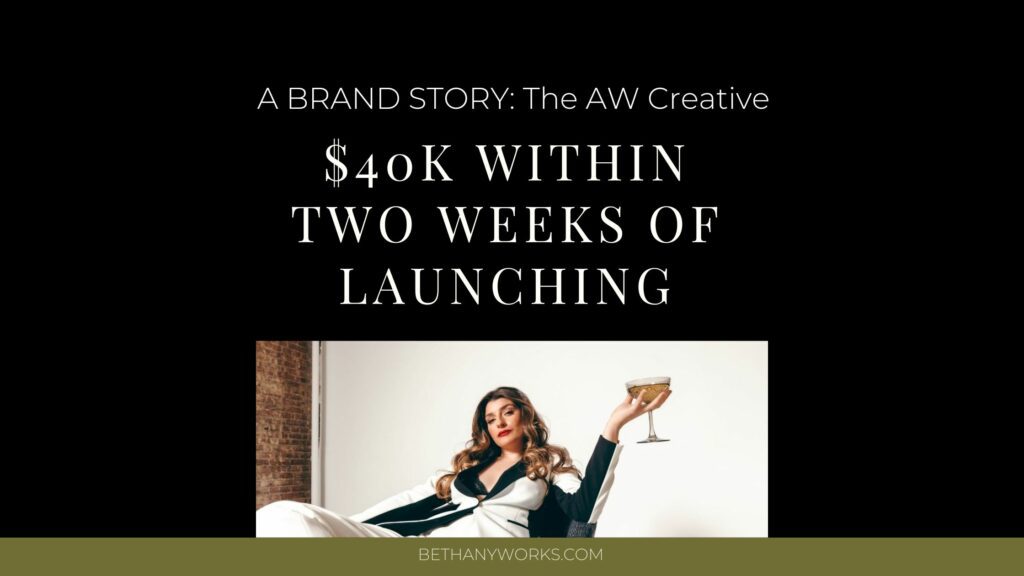Websites are going to be a necessity for any business, but when it comes to websites for coaches, there are a few details that you don’t want to skip out on.
As a brand and web designer for coaches and other businesses, I dedicate my time to working out strategies that are going to give clients sites that they not only love, but that also work for their business.
So, if you are looking to create a site that does just that, let’s take a look at everything you need to know about websites for coaches.
Start with Your Brand

Before you even think about jumping into your website, you need to have a strategic brand completely built out. This brand is going to play a major role in the design of the site, and without it, your site can feel disconnected.
Not only will your brand help dictate some of the visual aspects of your site like your color palette and your font suite, but it will also help you establish factors like your brand messaging and the language you should use throughout.
You can also create a sub-brand for your business if coaching is a new service you are going to offer. We did this for my client Liz Brindley, and it helped to not only hone in on the clients who are right for that service but also differentiate her coaching programs from the other products and services she offers!



Get a closer look at Liz’s coaching brand design here.
Why You Need a Website
Social media is everywhere now, and there is no denying that it has an impact on everyone. But, at the end of the day, there are some things that social media just can’t do that a website can.
Even if you see that your clients are finding you on social media, it is still vital that you have a strategic website built. This will allow you to lead them where you’d like them to go from the various platforms you are on.
While Instagram and TikTok are great places to share quick wins or small bits of information about your coaching programs, before people actually invest in you as a coach, they are going to want more of the nitty-gritty details that you just don’t have time or space to include on social media. (Not to mention, you don’t own anything on social media, making it easy for your programs to be taken. BUT if you build your website, you own that content and can take steps to protect it.)
Your website should be something that builds off of your social media, email list, and any other marketing efforts you have. This should be the place where potential clients can get all of their information and all of their questions answered before applying or reaching out to you. It’s the place for your credibility and authority to be clearly communicated.
Unearth your brand personality to stand out. Take the FREE Brand Archetype Quiz!

Key Things to Have on Websites for Coaches
So, when it comes to websites for coaches, there are a few key pieces that your site needs to have to help draw in your ideal clients and keep your programs booked out.
Information on Who You Actually Are

Your about page is going to play a major role in your site, especially as a coach. Unlike other businesses where people are buying products, you are going to be working directly with this person, and throughout your time coaching them, you may have a major impact on their life or their business.
This means that potential clients need to have full and complete trust in you, and a great way to start building that trust is through your about page. This is the perfect place to talk more about you, your journey, why you do what you do, and why you love it. (While still keeping the client at the center)
Maybe you are a brand designer who helps other designers get their business off the ground. You can talk about how you know what it is like starting from scratch and how you can help them avoid some of the mistakes that you made early on.
The same goes for any personal or life coaches. Is there any major event that happened in your life that others may be able to relate to or are struggling with right now? Talk about that and connect with them over it.
At the end of the day, these clients are investing in you as a person- which is unique to the coaching world. They are not buying a product or a service from your agency; they are telling you, “I value you and your expertise and your experience, and I think you can help me get to the next level.” In order for people to have that trust in you and that confidence, they need to feel like they actually know who you are as a coach and a human.
Credibility and Social Proof

Credibility and social proof are a big part of any business, but it plays an even bigger role when it comes to coaching businesses. You can’t exactly have a portfolio full of projects that you have completed or a list of products you have created, but you can have the words of past clients to back up the services you are offering.
Keep in mind that having a website that looks good and works adds to credibility. Pay attention to “looks good” – if your website looks like it was thrown together haphazardly, it will have the opposite effect. Remember that you are asking clients to make an investment in you. If it’s obvious that you didn’t invest in yourself, there’s a conflict of integrity.
Getting testimonials from your clients should absolutely be part of your offboarding process, and you should make sure that you keep screenshots or copies of all of the amazing things that your clients have said to put on your site. Videos are especially important!
To help, think of other businesses out there. A restaurant can say that their food is great, but you’ll actually have a higher chance of believing they’re great if they have a set of solid reviews from past customers saying their food is the best in the city.
The same thing is going to apply when it comes to clients choosing a coach. The more they can hear from other people about how amazing it was to work with you and the incredible results they got from the process.
Remember that it’s always quality over quantity. If you’re a newer coach, that’s okay. Even having just one review from a past coaching client showing the transformation that you helped them with is going to speak volumes.

RESULTS THAT SPEAK FOR THEMSELVES
Download our case studies + client experiences to review the impact of our website design and brand strategy services have beyond the stunning deliverables you’ll find in our portfolio.
If you are in the business coaching realm, it can also be really helpful if you are able to get testimonials that talk about the actual improvements clients have seen in their business and put those on your site.
This can be things like booking their first $10k month, expanding their offer suite, having their first successful launch, or anything where you can actually see the data that backs up the transformations you talk about on the rest of your site.
You also want to highlight any notable places you have been featured. This can be online publications you have been quoted in, podcasts you have been on, etc. Doing this adds an extra layer of credibility because other outside businesses trust the information you are providing and see the value in it.
A Clear Idea of Who You Work With

Every coach is going to target a different audience, and the coaching you offer is most likely specific to certain types of people or a specific issue they are facing. That should be very clear so that potential clients get a solid understanding of this right off the bat.
Now, this is important for two reasons. One, it ensures that your time is protected. As much as we want the site to be informative for potential clients, it is also a way to filter out clients who aren’t the right match so that you don’t spend energy on clients who may not book with you.
Two, it also gives potential clients information about you so they can make an informed decision about you as a coach. For example, maybe you love to work with super extroverted people. If someone is an introvert, that may be overwhelming for them, and they may be better off with a different coach.
The Transformation You Can Provide for Your Clients
Transformations are going to be vital when it comes to potential clients seeing the value in your coaching and envisioning themselves working with you to achieve their goals. My favorite way to show this is to do case studies on your site.
We did this with my client Anna (seen below) and broke down a few of the big factors of their coaching together, like the issue they were facing, how they addressed it, and their “aha moment.” Not only that, but we followed that up with a testimonial from that client right underneath.

What this does is it gives people actual data, whether that is going from $500 to $5k offers, from feeling overwhelmed to being confident, etc, and then gives them the social proof of the client saying how amazing and transformative the coaching was for them!
Easy and Consistent Access to the Contact Page
Finally, you want to make sure you have easy and consistent access to your contact page. Visitors should have no issue at all finding a way to get in touch with you. If your entire business is based on coaching, you should have at least one, if not more, contact buttons on each page.
If it is just a service you offer, you should have an entire page dedicated to your coaching program with multiple contact buttons throughout. It is all about limiting the barriers for people to get in touch, and having contact buttons everywhere is a great way to do that!
Final Thoughts on Websites for Coaches
I hope these tips on building websites for coaches help you as you work to create a site that not only feels like you and represents your brand well but also converts. If you are looking for some help on this journey, I’d love to be a part of it. You can click here to learn more about my brand and web design services, or get in touch with me here!




